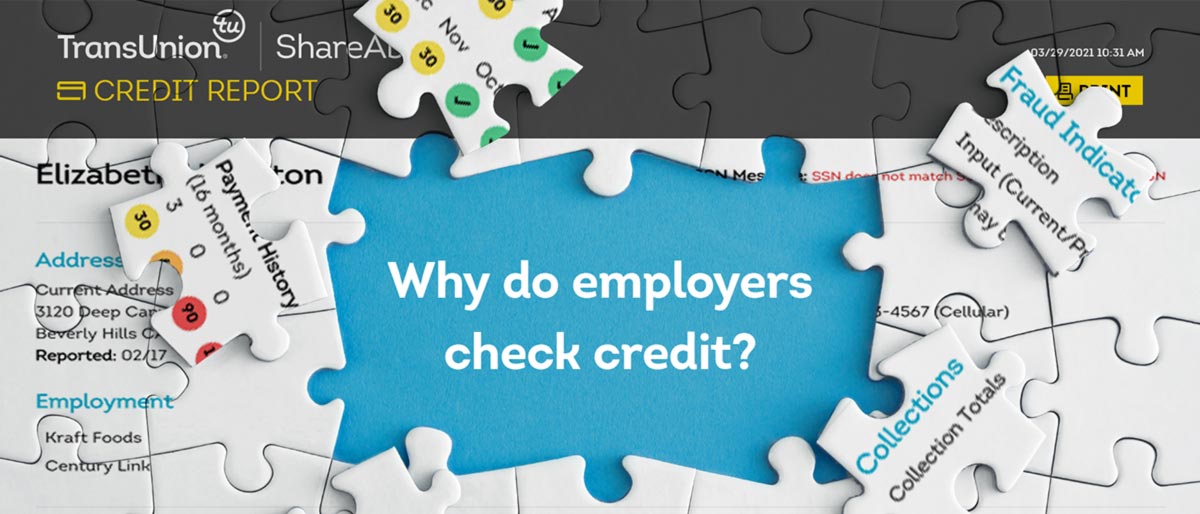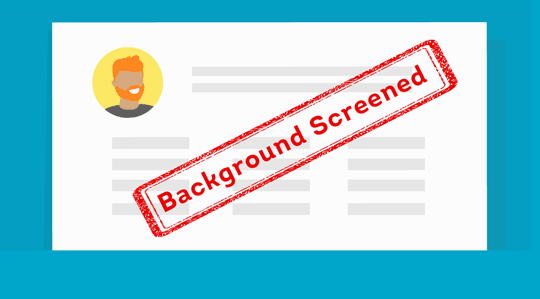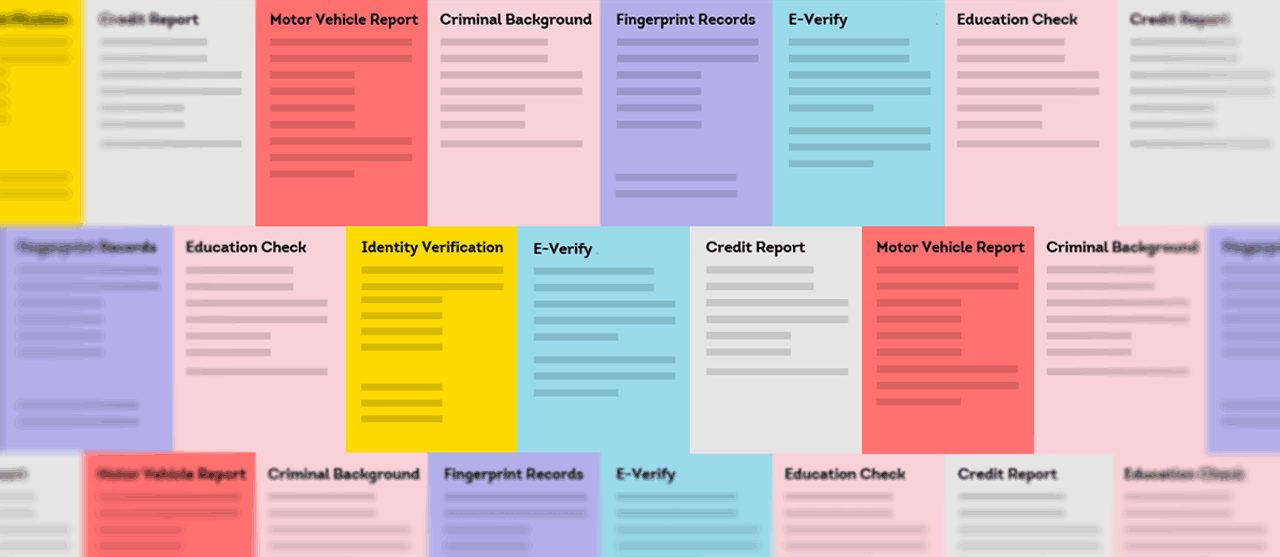You may be wondering “why do employers check credit?” The answer is simple: employers are concerned with assessing a job candidate’s aptitude in a multitude of ways, and the information included on a credit report can provide important insight. Primarily what employers want to uncover are aspects related to reducing hiring risk, assessing the candidate's financial responsibility and gauging trustworthiness.
Introduction
Credit reports have a major impact on many of the things we do and purchase, from getting a lower mortgage rate to being able to finance a new car to getting approved for a store credit card. In addition, credit history can also play an important role in the hiring process. While checking a credit report might not be top of mind when screening your job applicant, there are many reasons why hiring managers might choose to perform a pre-employment credit check.
Remember that this material is intended to provide you with helpful information and is not to be relied upon to make decisions, nor is this material intended to be or construed as legal advice. You are encouraged to consult your legal counsel for advice on your specific business operations and responsibilities under applicable law. Trademarks used in this material are the property of their respective owners and no affiliation or endorsement is implied.
Continue reading to learn why employers conduct credit checks, what you see within a credit report, and how a credit check can benefit your small business.
Reasons Why Employers Check Credit
1. Reduce Risk
Especially when it comes to hiring for financial or managerial roles, it can be important for employers to run credit checks on job applicants. Those who rank high in organizations are usually involved with decisions concerning money matters, and a poor credit report could be relevant to the hiring decision. Does your applicant have a track record of poor financial management? That could emerge as a real issue when they begin working for you. Running an employment background check that includes a credit report could give you a heads up. Whether you’re screening a new candidate or considering a current employee for promotion, ensuring their credit reflects positive financial capabilities is critical. Otherwise, business owners may risk hiring a candidate with negative consequences for the company.
2. Assess Financial Responsibility
Anyone can say that they’re responsible with money, but a credit check can reveal what’s actually going on in someone’s financial past. Employers run credit checks to help ensure their candidate manages their finances appropriately—after all, if they can’t do it for themselves, will they be able to do it for your business? Of course, there should always be communication and a chance for your applicant to explain negative credit information.
In some cases, it may be as simple as someone falling short on repaying their student loan debt because times were financially tough. Always do your due diligence to understand your applicant’s pre-employment credit report and be sure to consider other factors regarding their background. For example, if your applicant repeatedly skips their car payment, it could be an indicator of irresponsibility.
A National Association of Professional Background Screeners (NAPBS) survey found that only 31% of employers ran credit checks on job applicants. But employers quickly saw the value of credit insights when hiring.
Ultimately, credit reports may indicate whether a job applicant will put your business at risk. As an employer, you stand to gain the opportunity to spot warning signs in advance.
If the position you’re filling requires an employee to handle deal with financial information, handle company money, or access important financial data, then it’s crucial to hire someone that proves to be reliable and responsible—the future of your business may depend on it.
3. Gauge Trustworthiness
You want to feel confident that your employees are handling your business finances just as they would their own. So, how do they handle their own? In many situations, an employer might conduct a credit check on individuals who will hold a manager or financial title, as these roles typically involve making financial choices, and handling confidential information.A credit check can help gauge trustworthiness by revealing a history of how the applicant has made choices surrounding financial matters. A credit report that demonstrates smart decisions can be a strong signal that your candidate will make profitable decisions to help your business thrive.
Performing a credit check on every new hire may be the best way to help reduce risk. It’s easy with ShareAble for Hires. Normally, compared to small businesses, large employers have better access to powerful screening tools. With ShareAble, any legitimate small business is authorized quick, straightforward access to FCRA-compliant credit-based tools whenever they want. TransUnion ShareAble for Hires offers small business owners easy and secure access to their applicant’s credit report within minutes.
Get Deeper Insights into Your Applicant’s Financial Situation
Reviewing your applicant’s credit history may provide deeper insight into how they handle their financial obligations. A credit report lists information about an individual’s credit accounts, both past and present. It will detail the accounts in good standing, which includes the amount due and note whether payments have been made on time.
The report also lists those accounts with late payments, or debts that have been sent to collections services. You applicant’s credit reports may also include information on:
- Bankruptcies
- Collection accounts
- Recent employment history (not in every case)
The kinds of information contained in a credit report are outlined in the sample report below.
Basic Identifying Information

This section provides information about the job candidate's identification such as name, current address and phone number. It also ensures that the applicant's information matches what's on the credit file. If the applicant has reported the name of their employer to creditors or lenders in the past, then that employment history may appear on their credit report.
Consumer Credit Profile Summary

This section provides an overview of activity on file. It can reveal if your candidate is timely with payments, how much they pay toward their balances, and their spending behaviors. It is broken out into digestible parts to look at overall financial stability and appraise areas such as debt-level, payment history and monthly financial obligations. In the “tradeline” summary, you can get a good look at your job applicant’s active accounts where they owe money, including credit cards, student loans, and auto loans.
Tradelines (credit account history)

The word "tradelines" is an industry term that describes consumer accounts, including credit accounts or lines of credit. This information is reported to consumer reporting agencies and will appear every time you read a TransUnion credit report.
it is important to carefully study this section because it can give you an overall picture of financial health. An employeer can review whether an applicant carries a high debt load and how leveraged the applicant is. It provides an overview of various kinds of credit accounts that include mortgage, auto loans, credit cards and other kinds of credit lines, in addition to other debt obligations of the consumer.
You’ll be able to review information, such as account name, credit balance, credit limit, payment status, date of deliquency and more. And, this section shows current and past payment history and whether payments were made on time. If payments were made late, then it’s described in more detail in buckets of 30, 60, 90, 120, or 180 days.
Summary Of Collections

This section shows when an account becomes significantly overdue. It's another key part for an employer to look at to appraise an applicant's financial health. It includes accounts a creditor has sold to a professional collections agency. The collections section reports on unsecured debt, including credit cards and other kinds of personal loans. Collection information is retained on an applicant’s credit report for seven years from the first delinquency date.
Inquiries

This section shows what comapnies have viewed the job candidate's credit file during the past 1-3 years. This helps to understand if the consumer is potentially getting access to more lines of credit and could be overleveraging themselves.
Myth-buster: Contrary to popular belief, pre-employment credit reports do not include a credit score. The report that you receive includes information that contributes to the applicants score, like payment history or level of debt. For more information on why a credit score is not included in a credit report for employment screening, click here.
For more details and information on how to read a credit report from ShareAble for Hires, check out How to Read a Credit Report for Employment.

How Do Employers Benefit from Pre-Employment Credit Checks?
Knowing as much as possible about an applicant’s background can help you determine whether they meet your hiring criteria. Interviewing a potential candidate is a great way to understand their job experience and whether they’ll fit in with your business culture. But verifying records and using objective data to inform hiring decisions is essential to protecting your company in the long-run.
While criminal histories and identity verification are important, credit checks can be extremely relevant in positions that deal with finances. ShareAble for Hires credit checks offer a comprehensive view of a job candidate’s financial track record, which will help you determine how they handle their financial obligations.
The information on a credit report can help you evaluate whether or not a person is:
- Responsible—with their own money, and money that have borrowed
- Trustworthy—with repaying debts and paying on time
- Dependable—with relation to financial decisions and money management
If you’re considering a candidate for a role with access to sensitive financial information, assets, or funds, then it’s crucial to consider the risk that may be associated with the position and the importance of minimizing that risk.
Thousands of types of employers regularly review the credit histories of job applicants with ShareAble for Hires. This includes banks, government organizations, financial institutions, and brokerage houses. Many employers also evaluate credit history when screening candidates for accounting or money management positions, as these roles have increased potential for fraud.
Can Employers Check Credit History in Every State?
The use of consumer credit information is subject to federal and state laws regarding use of such information during the hiring process.
Some states may limit the use of credit reports for pre-employment screening purposes. In certain states and cities, regulations regarding the use of credit reports can impact the way employers utilize this information. In addition, some cities have passed laws that also impact the way employers use this information.
Where permissible by both state and federal law, ShareAble for Hires pre-employment screening services can help you gather the insight you need to make the right hire.
These consumer reports meet Fair Credit Reporting Act (FCRA) regulations and comply with the latest laws and regulations governing consumer reporting agencies.
Employer credit accounts are delivered straight from TransUnion, a trusted credit reporting agency that handles 230 million credit files domestically.

How Long Do Credit Checks Take?
As a small business owner, you don’t have time to wait for screening results to get delivered. You need quick, reliable, and cost-effective results so you can make a confident hiring decision right now. When you go through traditional background check companies, you could end up waiting days or weeks to get the answers you need.
With ShareAble for Hires, screening can be completed in mere minutes. Many pre-employment background checks and online screening tools can be slow and inefficient. But ShareAble has streamlined the process for all small businesses. This gives you rapid access to pre-employment screening tools and delivers critical applicant background information fast.ShareAble is unique because it:
- Involves no application to determine your eligibility
- Grants access for every legitimate small US business
- Makes the tool available for immediate use, 24/7
- Requires applicants to enter in information, not you
- Delivers reports fast so you can hire faster
Small businesses often have to jump through hoops just to get access to a tool for screening job applicants. ShareAble for Hires cuts through the red tape for you. Snip, snip.
Consider Adding Credit Checks to Your Screening Process
Every person you hire is another possible liability to your company. Running a more comprehensive pre-employment background check will give you insights beyond the interview. Gather all available information about a potential hire by making sure your screening process includes a credit check.
ShareAble for Hires gives you confidence to bring on new people today, especially when the roles involve finances. ShareAble also gives you:
- Authorized access for 100% of small businesses
- Transparency for both employer and applicant
- Compliant reports generated on-demand in minutes
ShareAble Hires gives small business owners a way to easy vet candidates—get a better look at your applicant with credit, criminal and ID verification reports.
Creating an account with ShareAble for Hires is always free. Some screening services charge you money just too sign-up. They tack on costly membership fees, or layer in other less-obvious costs.
ShareAble for Hires is different in that there is no cost to sign-up, no volume commitments and no hidden fees. This software is built for small businesses and designed to be fast, efficient, and easy to use. There are three convenient screening packages to choose from, and you only pay when you screen.







